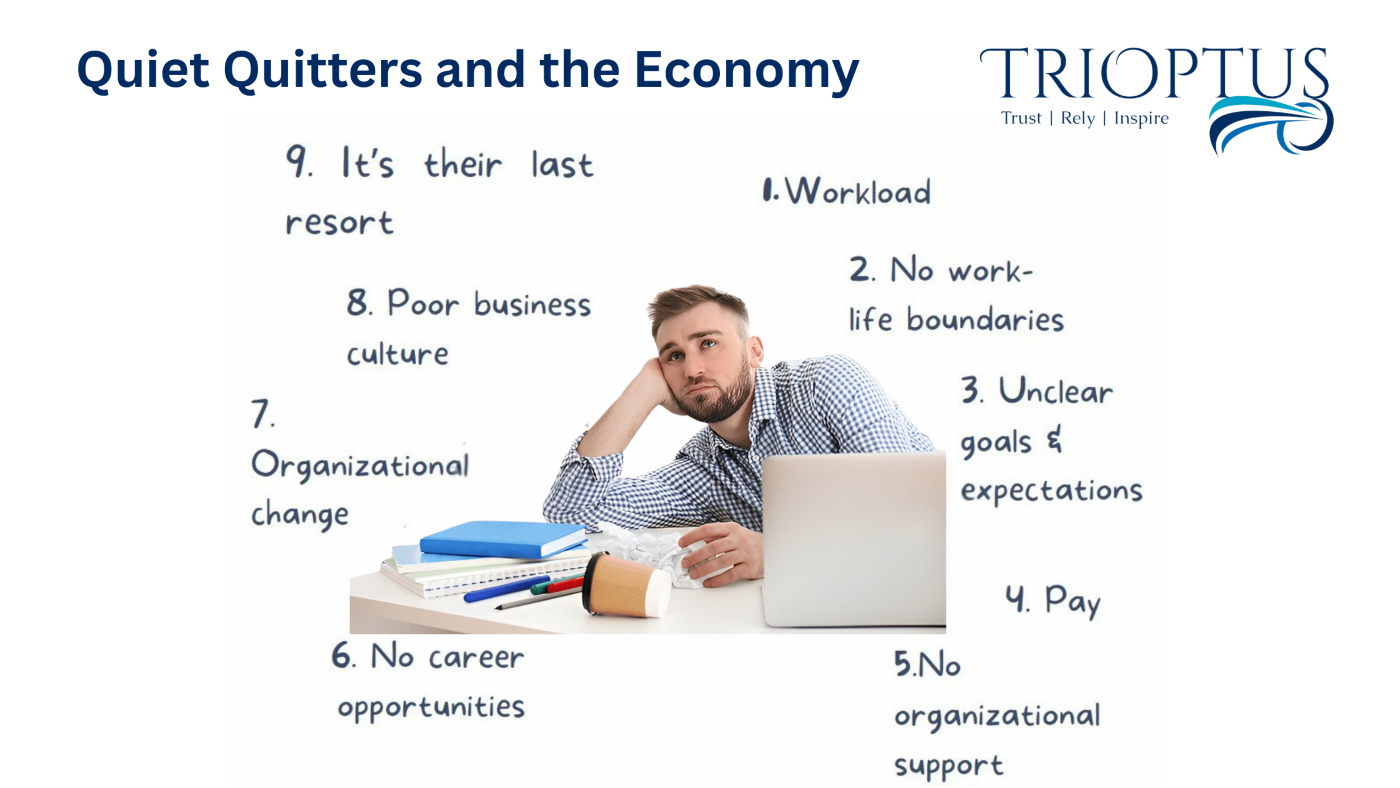
08 Apr 2025
The economy is slowing down. This might pause the trend of quiet quitting. But tech leaders should look at how they manage people. It’s not just the workers’ fault.
Quiet quitting is a big topic these days. It’s about how people act at work. Some say it’s when workers stop caring and do almost nothing. Others say it’s doing your job well but not doing extra stuff.
A magazine called Harvard Business Review explains it simply. Quiet quitting happens when workers don’t want to do extra things. Like staying late, coming in early, or going to meetings they don’t have to.
Where Did Quiet Quitting Come From?
Quiet quitting got popular from a TikTok video. It said working too hard and living for your job isn’t good. This idea came right after the Great Resignation. That’s when tons of people quit their jobs during the pandemic. Many didn’t even look for new ones.
Some sad stats show why this happened. Things like feeling down, mental health struggles, or hating work and benefits played a role. Sure, the pandemic made it worse. But changes like globalization and tech have been shaking up work for years.
Now, with the economy getting tough, quiet quitting worries people more. Workers who don’t like their jobs might just do the bare minimum. They keep their paycheck but don’t quit outright.
Whose Problem Is It?
Quiet quitting gets attention because it affects workers and bosses. We’ve all had a boss who asked too much. Like crazy deadlines or skipping vacation for work. We’ve also heard of startups where people sleep at the office to work more.
On the flip side, leaders see workers who just don’t care. They do their tasks but won’t go the extra mile. It’s annoying when you’ve tried to help them, and they still don’t try harder.
Both sides feel like victims here. Fixing it needs both to give a little. Bosses who think workers are lazy without checking their own rules will fail. Same goes for workers who want big pay but don’t want to work.
The Recession Changes Things
Some argue if we’re really in a recession. But the big economic boost after the pandemic is gone. Tech companies went from hiring tons of people to firing them. Some cut over 10% of their teams.
Last year, tech jobs seemed endless. Companies thought growth would never stop. They fought hard to hire people. Workers felt they could quit and find better jobs fast—more money, cool perks like free food.
Having great skills made some workers slack off. Why work hard if you can just leave for more cash? Now, with fewer jobs, some might think workers deserve this. Bosses might want to push harder to stop quiet quitting.
But think about this: Those workers helped your company survive the pandemic. They got you through wild times. Relationships with workers need respect from both sides. Being selfish won’t work.
Is Quiet Quitting Really Bad?
Quiet quitting sounds new, but it’s not. Work has changed a lot. Globalization, remote jobs, and gig work are normal now. The old 8-to-5 office life isn’t the only way anymore.
Bosses and workers won’t always agree. Maybe it’s about skills, effort, or how much work matters to someone. If a worker does their job well, does it hurt if they skip extra meetings or events? If they’re good at their tasks, does it matter if work isn’t their top priority?
Leaders often get to the top because they love their job. They might expect everyone to feel the same. That’s not always fair. Passion makes sense for some roles, but not all. In some jobs, doubting the company a little can even help.
Looking Deeper
Quiet quitting seems simple, but it’s not. It’s about big questions. Like how much of your life should go to work. Research says bad bosses cause it more than lazy workers.
Bosses might not want to think about deep stuff like that. But people have asked these questions forever. Everyone values work differently. A young person might work more than a parent, but not always.
It’s okay if someone lives for work or puts life first. Don’t judge based on age or anything else. Make a workplace where people can talk about what matters to them.
Leaders can help a lot. If they share their struggles—like balancing work and life—it shows workers it’s okay to speak up. A little understanding goes far.
Stopping Quiet Quitting
The worst way to fix quiet quitting is by spying on workers. Like tracking their computer use or making productivity scores. That assumes there’s one right way to work. It’s tempting, but it doesn’t tell you who’s really doing good work.
The best way is to check if it’s a big problem or just one person. Some workers will always slack off, especially when jobs are hard to find. Don’t just call them lazy and move on.
Look at the worker. Are they hurting the company or just working differently? Are they part of a trend or alone? If it’s just them, talk to them. Maybe they’re bored or work in a weird way.
Check their boss too. Quiet quitting often comes from bad leadership. If a leader sees it everywhere, they might need help themselves.
Keep It from Starting
Quiet quitting is about workers not feeling engaged. If they’re not into their jobs, don’t assume they’re bad. Look at how to get them excited.
It’s tricky. Giving workers freedom, like picking their hours, might help more than strict rules. Flexibility can cut quiet quitting down.
Don’t try one fix for everyone. Give options so workers can work how they’re best. Blaming them is easy, but thinking about your company and focusing on engagement can stop quiet quitting before it starts.
In the end, TriOptus suggests leaders focus on understanding their teams. Build a place where people feel good about work, and quiet quitting won’t be a big deal in 2025.











Comments (0)